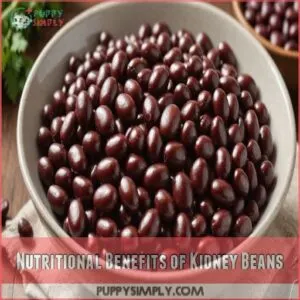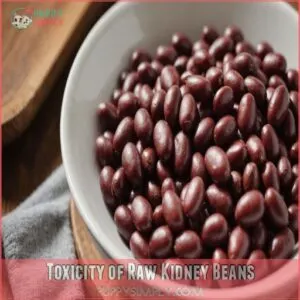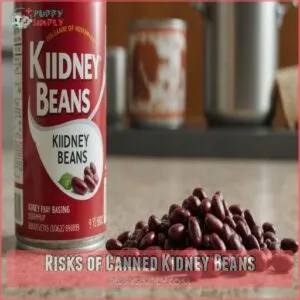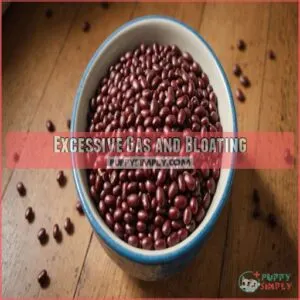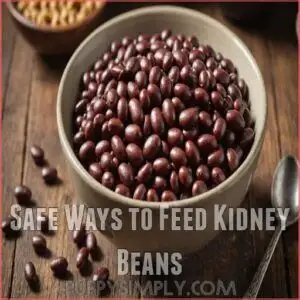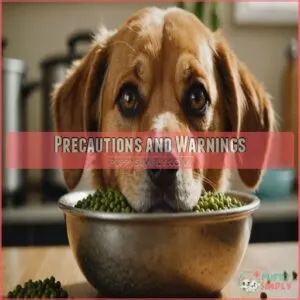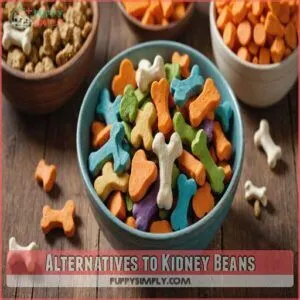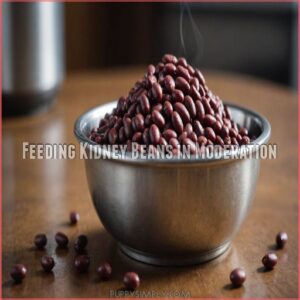This site is supported by our readers. We may earn a commission, at no cost to you, if you purchase through links.

Imagine serving your pup a side dish that’s both a protein powerhouse and a fiber fiesta! Just make sure these beans are plain—no sneaky spices or sauces.
While your pooch can enjoy them in moderation, kidney beans shouldn’t hog the spotlight in their diet. So, keep it balanced, and watch for any adverse reactions. Curious about other bean varieties or safe serving tips. While it’s essential to introduce beans gradually, dogs eating beans in moderation can help prevent digestive issues? Stick around for the full scoop on dog-friendly beans!
Table Of Contents
- Key Takeaways
- Nutritional Benefits of Kidney Beans
- Risks of Kidney Beans for Dogs
- Safe Ways to Feed Kidney Beans
- Other Safe Beans for Dogs
- Precautions and Warnings
- Alternatives to Kidney Beans
- Feeding Kidney Beans in Moderation
- Frequently Asked Questions (FAQs)
- Can dogs eat beans?
- Can dogs eat kidney beans?
- Can dogs eat garbanzo beans?
- Can dogs eat lima beans?
- Can dogs eat canned kidney beans?
- What beans can dogs not eat?
- Can dogs have red beans and rice?
- Are canned kidney beans cooked?
- Can dogs eat kidney beans daily?
- What portion size of kidney beans is safe?
- Are kidney beans safe for puppies?
- Do kidney beans improve a dogs coat?
- Can dogs with allergies eat kidney beans?
- Conclusion
Key Takeaways
- Feeding your dog cooked kidney beans can offer nutritional benefits, including protein, fiber, vitamins, and minerals through safe and healthy legumes. You should only feed your dog cooked kidney beans, never raw ones, due to the presence of toxic lectins in raw beans.
- Kidney beans offer nutritional benefits like protein, fiber, vitamins, and antioxidants, but they should not make up a significant portion of your dog’s diet.
- Canned kidney beans often contain high levels of sodium and preservatives, so you should rinse them thoroughly before feeding them to your dog, and ideally choose home-cooked beans instead.
- Always monitor your dog for any adverse reactions after introducing kidney beans, and consult your vet if you have concerns.
Nutritional Benefits of Kidney Beans
You’ll be pleased to know that kidney beans can supercharge your dog’s diet with essential nutrients like protein, fiber, vitamins, and minerals.
When you feed your pup properly cooked kidney beans, you’re giving them a nutritious boost packed with antioxidants that help protect their cells and support their overall health.
High-Quality Protein Source
Your furry friend can benefit from kidney beans as a high-quality protein source, packing about 15 grams of protein per cup.
They’re especially great for active dogs who need extra energy and senior pups watching their weight.
As a plant-based protein alternative, kidney beans offer complete nutrition when paired with other proteins.
You’ll love that they’re budget-friendly while delivering essential amino acids your dog needs for muscle maintenance.
Rich in Fiber
Kidney beans pack a fiber punch that’ll keep your pup’s digestive system running like a well-oiled machine.
Along with protein, this dietary fiber helps maintain healthy digestion and can prevent constipation in dogs.
It’s like nature’s broom for your dog’s gut!
The fiber also helps your furry friend feel fuller longer, making kidney beans an excellent addition for weight management in pudgy pooches.
Vitamins and Minerals
Beyond fiber’s benefits, these little powerhouses pack a nutritional punch that’ll make your pup’s tail wag.
They’re loaded with minerals and vitamins that support your dog’s well-being.
Here’s what makes them special:
- Iron-rich beans help create healthy red blood cells, like tiny delivery trucks carrying oxygen through your dog’s body
- Magnesium supports strong bones, like a natural shield
- Potassium keeps your dog’s heart beating strong, like a well-oiled engine
Antioxidants
While vitamins and minerals work their magic, the antioxidants in cooked kidney beans pack a powerful punch against free radical damage in your dog’s body. These natural defenders help protect your pup’s cells from oxidative stress, supporting their immune system and overall health.
Let’s break down the key antioxidant benefits you’ll find in these nutritious beans:
| Antioxidant Type | Benefits | Daily Impact |
|---|---|---|
| Flavonoids | Reduces inflammation | Supports joint health |
| Polyphenols | Fights free radicals | Boosts immunity |
| Anthocyanins | Cell protection | Promotes longevity |
| Beta-carotene | Eye health | Improves vision |
| Vitamin C | Tissue repair | Enhances healing |
Risks of Kidney Beans for Dogs
While you might think kidney beans are always a healthy treat for your dog, they can actually pose some serious risks when not prepared correctly.
You’ll need to watch out for raw kidney beans’ toxicity, canned varieties’ high sodium content, and potential digestive issues that could make your furry friend uncomfortable.
Toxicity of Raw Kidney Beans
Raw kidney beans pack a dangerous punch for your furry friend.
They contain high levels of lectin phytohemagglutinin (PHA), a toxic compound that can make your dog seriously ill.
Even a few uncooked beans could lead to severe vomiting, diarrhea, and abdominal pain within hours.
You’ll want to completely avoid raw kidney beans and always cook them thoroughly to break down those harmful PHA toxins.
Risks of Canned Kidney Beans
Three hidden dangers lurk in those convenient canned kidney beans you’re eyeing for your pup. You’ll need to think twice before serving them, as they pack more than just beans inside those tins. The high sodium content and preservatives can upset your dog’s delicate system, leading to potential health issues.
- Excess sodium can strain your dog’s kidneys and heart
- Chemical preservatives might trigger allergic reactions
- BPA from can linings could leach into the beans
- Added seasonings and spices often aren’t dog-friendly
- Lower nutritional value compared to freshly cooked beans
Excessive Gas and Bloating
Feeding your furry friend kidney beans might lead to some unpleasant surprises. These legumes can cause excessive gas and bloating in dogs, making them uncomfortable.
You’ll want to watch for signs like a swollen belly or frequent passing of gas.
To avoid these issues, introduce kidney beans slowly and in small amounts. If problems persist, try alternative protein sources or consult your vet for personalized dietary advice.
Allergies
While kidney beans are packed with nutrients, they can be a hidden culprit for allergies in some dogs.
You’ll want to keep an eye out for these tell-tale signs:
- Itchy skin or excessive scratching
- Gastrointestinal upset, like vomiting or diarrhea
- Swelling around the face or paws
If you suspect your furry friend might be allergic, it’s best to consult your vet. They can recommend allergy testing or suggest alternative protein sources to keep your pup happy and healthy.
Safe Ways to Feed Kidney Beans
You can safely feed your dog kidney beans by cooking them thoroughly, which involves properly preparing them by soaking, boiling, and simmering to remove harmful lectins according to kidney bean preparation guides. You can safely feed your dog kidney beans by cooking them thoroughly and avoiding additional ingredients.
Plain, well-cooked kidney beans are a nutritious treat for your furry friend.
Stick to small portions to make sure your dog enjoys this treat without any digestive upset.
Cooking Methods
To safely cook kidney beans for your furry friend, you’ve got options.
Boiling is your best bet, as it effectively neutralizes toxic compounds.
You can also try pressure cooking for a quicker fix.
Here’s a handy guide to cooking methods:
| Method | Preparation | Cooking Time |
|---|---|---|
| Boiling | Soak overnight | 1-2 hours |
| Pressure Cooking | Rinse beans | 20-30 minutes |
| Slow Cooking | Soak and rinse | 6-8 hours |
| Steaming | Not recommended | N/A |
| Roasting | Not recommended | N/A |
Remember, thorough cooking is key for your pup’s safety.
Avoiding Additional Ingredients
Now that you’ve cooked those kidney beans, let’s keep things simple.
Skip the salt, garlic, onions, spices, and oils – they’re no-nos for your furry friend.
These extras can upset your dog’s tummy or even be toxic, which is why it’s important to follow the digestive health guidelines.
Stick to plain, cooked beans for a safe treat.
Think of it like serving up a doggy delicacy – sometimes less is more, especially regarding your pup’s health.
Canned Vs. Cooked Vs. Raw
Regarding kidney beans for your furry friend, not all forms are created equal.
Here’s the scoop on safe preparation:
- Raw: Absolutely off-limits due to high toxin levels.
- Canned: Proceed with caution; rinse thoroughly to remove excess sodium.
- Cooked: Your best bet for safety and nutrition.
Always opt for plain, well-cooked kidney beans. Avoid seasonings or additives that might upset your dog’s tummy. Remember, proper preparation is key to keeping your pup’s tail wagging and tummy happy!
Recommended Serving Size
Let’s talk portion control for your pup’s kidney bean treats.
Your dog’s size matters – a Chihuahua can’t chow down like a Great Dane!
Start small, maybe a teaspoon for tiny pooches or a tablespoon for bigger breeds.
Mix it up with their regular dog food, aiming for no more than 10% of their daily grub.
Remember, every dog’s different, so keep an eye out for any tummy troubles.
Other Safe Beans for Dogs
You’ll be pleased to know that kidney beans aren’t the only legumes your dog can enjoy.
Green beans, black beans, lima beans, pinto beans, and garbanzo beans are all safe options for your furry friend when prepared correctly.
Green Beans
Green beans are a canine super-snack, packed with nutrients and low in calories.
You can feed them raw, steamed, or boiled without any seasoning.
These crunchy treats offer:
- Fiber for digestive health
- Vitamins A, C, and K
- Manganese for bone strength
- Omega-3 fatty acids
Most dogs love the satisfying crunch of green beans.
They’re perfect for pups on a diet or as a healthy alternative to store-bought treats.
Just remember, moderation is key in any dog’s diet.
Black Beans
Black beans are another safe option for your furry friend.
Like their green cousins, they’re packed with fiber and protein.
You can easily whip up some black bean recipes for your pup, but keep it simple.
As a general guideline, start with small amounts (about a tablespoon per cup of dog food) and monitor your dog’s reaction, as recommended for incorporating beans into your dog’s diet safely.
Cooked, unseasoned black beans offer great nutrition without the risks.
Just remember, moderation is key.
Too many beans might leave your dog feeling a bit… well, let’s just say you’ll both appreciate some fresh air afterwards!
Lima Beans
Lima beans are another safe option for your furry friend.
These nutritious legumes pack a protein punch and offer essential vitamins.
When preparing lima beans for your dog, cook them thoroughly without any seasoning.
Start with small portions to avoid tummy troubles.
Remember, moderation is key – lima beans should complement, not replace, your dog’s regular diet.
As with any new food, keep an eye out for allergic reactions or digestive issues.
Pinto Beans
Pinto beans are another safe option for your furry friend.
These nutrient-packed legumes offer a protein punch similar to kidney beans, but with a milder flavor.
You can add them to your pup’s diet in moderation, just like kidney beans.
Cook them thoroughly without seasoning, and introduce them slowly to avoid tummy troubles.
Remember, variety is the spice of life – even for dogs!
Garbanzo Beans
Your dog’s diet can benefit from garbanzo beans, also known as chickpeas.
These legumes pack a nutritional punch and are safe for canine consumption when prepared properly.
Here’s what you need to know:
- Low in calories, high in fiber and protein
- Rich in vitamins and minerals like folate and potassium
- May aid in weight management and digestion
- Can be mashed or pureed for easier eating
- Serve plain, without added salt or seasonings
Remember, moderation is key when introducing any new food to your pup’s diet.
Precautions and Warnings
While kidney beans can be a nutritious treat for most dogs, you’ll need to take some precautions to make sure your furry friend’s safety.
It’s important to think about factors like your dog’s age, health condition, and individual needs before adding kidney beans to their diet.
Puppies and Kidney Beans
When it comes to puppies and kidney beans, tread carefully.
Their developing digestive systems are more sensitive than adult dogs’.
Start with tiny amounts, if at all, and watch for signs of tummy trouble.
Stick to puppy-specific food for balanced nutrition during this important growth phase.
If you’re set on introducing beans, consult your vet first.
Remember, what’s safe for grown dogs isn’t always suitable for pups.
Prioritize their health and growth over bean experiments.
Dogs With Kidney Disease
Dogs with kidney disease need special care regarding their diet.
While kidney beans can be nutritious, they’re not always the best choice for these pups.
Here’s what you need to know:
- Consult your vet about a kidney disease diet
- Limit phosphorus intake, which can be high in kidney beans
- Opt for low-protein dog food options to reduce kidney strain
- Focus on hydration importance to support kidney function
Always prioritize veterinary advice for your furry friend’s unique needs.
Monitoring Dog’s Health
Vigilant pet parents keep a watchful eye on their furry friends.
After introducing kidney beans, monitor your dog’s weight, water intake, stool consistency, energy levels, and coat condition.
Be sure to check out products like dog kidney beans supplements dog kidney beans items to make sure the best options for your pet’s needs.
These indicators are like canine health barometers.
If you notice any changes, such as excessive gas or lethargy, it’s time to play detective.
Trust your gut instinct — you know your pup best.
When in doubt, ring up your vet for expert advice.
Adjusting Diet as Needed
Keeping a watchful eye on your furry friend’s reaction to kidney beans is important.
If you notice any signs of discomfort, it’s time to tweak their diet.
Here’s what to look out for:
- Excessive gas or bloating
- Changes in stool consistency
- Decreased appetite or energy levels
Some dogs may be more sensitive to certain foods, like those with high sodium content. Remember, every dog’s digestive system is unique.
You might need to adjust portion sizes or frequency of kidney bean treats.
If concerns persist, don’t hesitate to consult your vet for personalized advice on dietary changes.
Alternatives to Kidney Beans
If you’re looking for alternatives to kidney beans for your dog’s diet, consider healthy options like carrots, sweet potatoes, and pumpkin, which are both nutritious and safe.
These vegetables provide essential vitamins and fiber, helping support your dog’s overall health while avoiding the risks associated with kidney beans.
Carrots
Imagine a crunchy treat: carrots.
They’re a fantastic alternative to kidney beans for dogs, offering vitamins, fiber, and low calories.
Carrots help improve eyesight and dental health.
If your dog has specific dietary needs or restrictions, consider exploring options like legume-free dog food to make sure their diet is well-rounded.
Consider these carrot tips:
| Tip/Benefit | Description | Safety Note |
|---|---|---|
| Raw carrots | Great for chewing | Supervise to prevent choking |
| Steamed carrots | Easier to digest | Avoid added seasonings |
| Carrot sticks | Ideal for snacks | Cut into manageable pieces |
Sweet Potatoes
After carrots, sweet potatoes bring your dog’s diet a colorful twist.
They’re a safe, tasty alternative to kidney beans.
Packed with vitamins, sweet potato benefits include boosting immune health and digestion.
Just make sure they’re cooked properly to avoid any sweet potato allergy risks.
Try storing them in a cool spot for freshness, and explore creative sweet potato recipes for variety.
Pumpkin
Pumpkin is a fantastic alternative to kidney beans for dogs.
You can also find dog-safe bean options, such as those sold by online retailers of Dog Safe Beans Products.
Packed with fiber and beta-carotene, it supports digestion and boosts immunity.
You might whip up pumpkin recipes using puree or seeds to add variety to your dog’s meals.
Remember, while pumpkin benefits dogs, monitor any allergies and consult a vet.
Balancing is key to feeding kidney beans in moderation.
Feeding Kidney Beans in Moderation
You want to give your dog kidney beans? That’s fine, but remember moderation is key; too many can upset their tummy, so stick to small portions as part of a balanced diet.
Portion Control
When considering kidney beans for your dog, portion control is key.
Focus on their weight and individual needs when determining the bean size and frequency of feeding.
Too many beans can lead to digestive issues.
Stick with small, cooked quantities of canned kidney beans to offer these fiber-rich treats safely.
Feeding kidney beans in moderation helps your pet stay healthy.
Avoiding Overfeeding
You know how Portion control tips are essential for dog weight management, right?
Overfeeding kidney beans, even if they’re packed with nutrients, can upset a dog’s belly and cause gassiness.
Watch for signs of overfeeding like bloating or decreased energy.
If you’re looking for safe snack options, consider fruits like apples with their core and seeds removed, as outlined in the ultimate guide to what chihuahuas can and cant eat. Offer healthy dog treats instead, and remember: moderation matters!
Can Dogs Eat Kidney Beans responsibly? Absolutely, with care!
Balanced Meal Options
Balancing your pup’s diet is like fine-tuning a guitar—each note counts. Opt for these balanced meal options:
- Mix kidney beans with dog food brands, making sure dietary needs are met.
- Create homemade recipes, blending beans for nutritional benefits.
When it comes to buying products specifically for your dog, such as kidney bean-based dog treats, you can find them on websites selling dog kidney beans products.
- Incorporate bean-based treats while considering portion control.
Remember, understanding "Can Dogs Eat Kidney Beans?" ensures their safety and health.
Frequently Asked Questions (FAQs)
Can dogs eat beans?
Picture a tail wagging joyfully at mealtime.
Dogs can enjoy beans like black, pinto, or green, but always serve them cooked and plain.
Avoid raw or canned versions high in sodium, and consult a vet first.
Can dogs eat kidney beans?
Raw kidney beans are toxic to dogs due to a toxin called phytohemagglutinin.
However, cooked kidney beans, in moderation, are generally safe.
Always consult your vet before adding new foods to your dog’s diet.
Can dogs eat garbanzo beans?
Regarding garbanzo beans, moderation is key.
Dogs can eat them if they’re cooked plainly without spices, salt, or oils.
Always start with small portions and observe for any digestive issues.
Consult your vet first.
Can dogs eat lima beans?
Lima beans can be a nutritious treat for your dog, providing protein and fiber.
Always cook them thoroughly and serve plain—skip the salt and seasonings.
Monitor your dog’s reaction and consult your vet before big dietary changes.
Can dogs eat canned kidney beans?
While canned foods offer convenience, they often come with a side of preservatives and sodium that aren’t dog-friendly.
It’s best to stick to dried, thoroughly cooked kidney beans, ensuring a safer, tastier option for your furry friend.
What beans can dogs not eat?
You should avoid feeding your dog raw kidney beans or any beans with harmful additives like garlic, onions, or excessive salt.
These can cause digestive problems and may be toxic, affecting your dog’s health and safety.
Can dogs have red beans and rice?
Dogs can eat red beans if they’re cooked plain, as they are a good source of protein, fiber, iron, potassium, and folate when served without seasonings safe beans for dogs, but rice may cause digestion issues.
Avoid adding spices or salt.
Always start with small portions and check with your vet before introducing new foods to your dog’s diet.
Are canned kidney beans cooked?
Picture a world where canned kidney beans are already cooked for convenience.
They’ve been soaked and boiled before sealing, ensuring they’re safe for immediate consumption.
Just remember, they might contain added sodium or preservatives.
Can dogs eat kidney beans daily?
No, daily kidney bean consumption isn’t recommended for dogs. They’re not toxic, but too many can upset their tummies. Moderation is key; always consult your vet before dietary changes.
What portion size of kidney beans is safe?
Start with one or two tablespoons of cooked kidney beans per day for small dogs, and up to a quarter cup for larger dogs.
Monitor closely for digestive issues, and consult your vet before regular feeding.
Are kidney beans safe for puppies?
Just like you’d cautiously tread new paths, introduce kidney beans to your puppy carefully.
Cook them completely, avoiding raw beans’ toxicity.
Stick to small portions, ensuring your pup’s digestion adjusts, and consult your vet beforehand for peace of mind.
Do kidney beans improve a dogs coat?
Kidney beans, rich in proteins and vitamins, might assist in promoting a dog’s coat health by supporting overall nutrition.
Kidney beans may be beneficial for dog’s coat health, but evidence is limited.
However, since evidence is limited, consult a veterinarian to confirm it’s suitable for your dog’s dietary needs.
Can dogs with allergies eat kidney beans?
Better safe than sorry" applies here.
Dogs with allergies might tolerate kidney beans if cooked thoroughly without additives.
Test with small amounts first and consult your vet for personalized advice.
Monitor for any allergic reactions or digestive issues.
Conclusion
Before you picture your dog devouring mountains of kidney beans, remember moderation is key!
Cooked kidney beans can be a nutritious addition, packed with protein and fiber, but they should never dominate your dog’s diet.
Overindulgence might lead to digestive troubles or worse.
Make sure beans are plain, avoiding spices or sauces, and be cautious with canned varieties.
Always keep an eye out for any allergies or health changes.
With careful serving, kidney beans can be a tasty, healthy treat.

